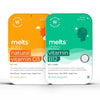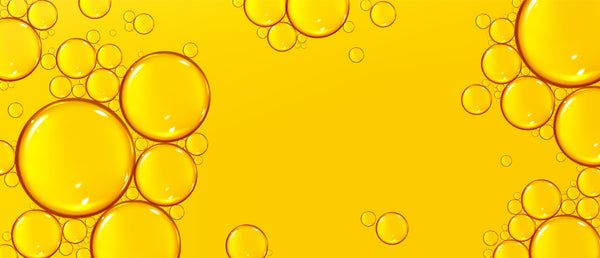Vitamins are tiny compounds that are continuously on their toes to ensure that you get energy from the food you eat, repair your body cells, protect them from internal damage, fight, and keep you in the best of health. They are needed in small amounts, but they carry out around 100 different processes in our body. Different vitamins, such as A,B, C, D, E, and K, have different roles to perform. However, our body is unable to make them, so it's important to supply them with food or supplements. There are around a total of 13 vitamins, including A, 8 of which belong to the B group. In this article, we will explore the importance of vitamin B and its various forms, with a particular focus on vitamin B12, its sources, and b12 importance in the body.
Importance of Vitamin B in Health
Vitamin B's, a.k.a. B-complex vitamins, are a group of essential nutrients that play a crucial role in various bodily functions. These vitamins are water-soluble, meaning they are not stored in the body and must be regularly obtained through diet or supplementation.
The B-complex vitamins consist of eight different types, each with its own unique properties and functions. These vitamins include B1 (thiamine), B2 (riboflavin), B3 (niacin), B5 (pantothenic acid), B6 (pyridoxine), B7 (biotin), B9 (folate or folic acid), and B12 (cobalamin). Collectively, these vitamins are essential for maintaining good health and are involved in a wide range of bodily processes, including energy metabolism, nerve function, and the formation of red blood cells.
B1 (Thiamine): Thiamine is crucial for the conversion of food into energy and the proper functioning of nerve cells.
B2 (Riboflavin): Riboflavin is essential for the metabolism of fats, drugs, and steroids in the body.
B3 (Niacin): Niacin plays a vital role in DNA repair, cell signaling, and energy production.
B5 (Pantothenic Acid): Pantothenic acid is involved in the synthesis of fatty acids and cholesterol.
B6 (Pyridoxine): Pyridoxine is essential for brain development and function and helps the body make the hormones serotonin and norepinephrine.
B7 (Biotin): Biotin is necessary for the metabolism of fatty acids, amino acids, and glucose.
B9 (Folate): Folate is crucial for DNA synthesis and repair, as well as cell division and growth.
B12 (Cobalamin): Vitamin B12 plays a unique role in red blood cell formation, neurological function, and DNA synthesis.
Deficiencies of Vitamin B
B vitamin deficiencies can vary in severity. In mild cases, symptoms may be subtle and nonspecific, making diagnosis more challenging. In cases of severe or long-term deficiencies, the symptoms can become more pronounced and have a significant impact on overall health.
One of the most common deficiencies of vitamin B is vitamin B12 deficiency. Vitamin B12 is primarily found in animal-based foods, making it a challenge for vegetarians and vegans to obtain sufficient amounts through their diet. A deficiency of vitamin B12 can have serious consequences for your health.
“B” ware of these signs. These could indicate a deficiency of B12.
- Anemia: A lack of vitamin B12 can result in megaloblastic anemia, a condition characterized by the production of large, abnormal red blood cells that cannot effectively carry oxygen.
- Nerve Damage: Neurological symptoms can include numbness and tingling in the hands and feet, balance problems, and memory loss.
- Fatigue: A lack of B12 can lead to fatigue and weakness due to its role in energy metabolism.
- Depression and Mood Changes: B12 deficiency has been linked to mood disorders, including depression and irritability as B12 is involved in the production of neurotransmitters(brain chemicals) responsible for mood regulation.
- Cognitive Impairment: Memory problems, difficulty concentrating, and cognitive decline are common in individuals with B12 deficiency.
Here is how to overcome Vitamin B12 Deficiency
The importance of vitamin B cannot be overlooked, especially vitamin B12, knowing its significance in keeping us healthy. Following are some sources through which you may ensure a regular supply.
Sources
- Diet
- Meat: Beef, pork, and lamb are excellent sources of vitamin B12.
- Poultry: Chicken and turkey also provide B12.
- Fish: Fatty fish like salmon, trout, and mackerel are rich in B12.
- Dairy Products: Milk, cheese, and yogurt contain vitamin B12.
- Eggs: Eggs are a good source of B12
Fortified foods and supplements
Vegan sources of vitamin B12, such as fortified foods and supplements offer a reliable solution to ensure adequate intake. Vegan vitamin b12 supplements typically contain cyanocobalamin, methylcobalamin, or hydroxocobalamin, which are bioavailable forms of B12. They support red blood cell formation, nerve function, and overall well-being. Vitamin B12 supplementation can also help prevent megaloblastic anemia, which makes people feel weak and tired. Some of the best B12 supplements are now available in thin oral strips using nanotechnology that delivers precise nutrients in the quickest and most bioavailable forms.
Wrapping Up
Vitamin B, a group of essential nutrients, plays a pivotal role in maintaining overall health and vitality. Comprising eight distinct forms, including B1 to B12, each contributes uniquely to bodily functions. Vitamin B12, also known as cobalamin, stands out for its exceptional significance. It plays a central role in red blood cell formation, neurological health, and DNA synthesis. A deficiency can lead to anemia, nerve damage, fatigue, and mood disorders. As a water-soluble vitamin, regular dietary intake or supplementation is vital. B12 primarily derives from animal-based foods, necessitating special consideration for vegans who may need fortified foods or supplements.
References
https://www.ncbi.nlm.nih.gov/pmc/articles/PMC9662251/
https://www.hsph.harvard.edu/nutritionsource/vitamins/vitamin-b/
https://www.medicoverhospitals.in/medicine/vitamin-b-complex
https://www.healthdirect.gov.au/foods-high-in-vitamin-b
https://www.researchgate.net/publication/339112981_Reconsider_B-vitamins_play_a_vital_role_in_maintaining_good_health_and_well-being
https://www.nhs.uk/conditions/vitamins-and-minerals/vitamin-b/


























